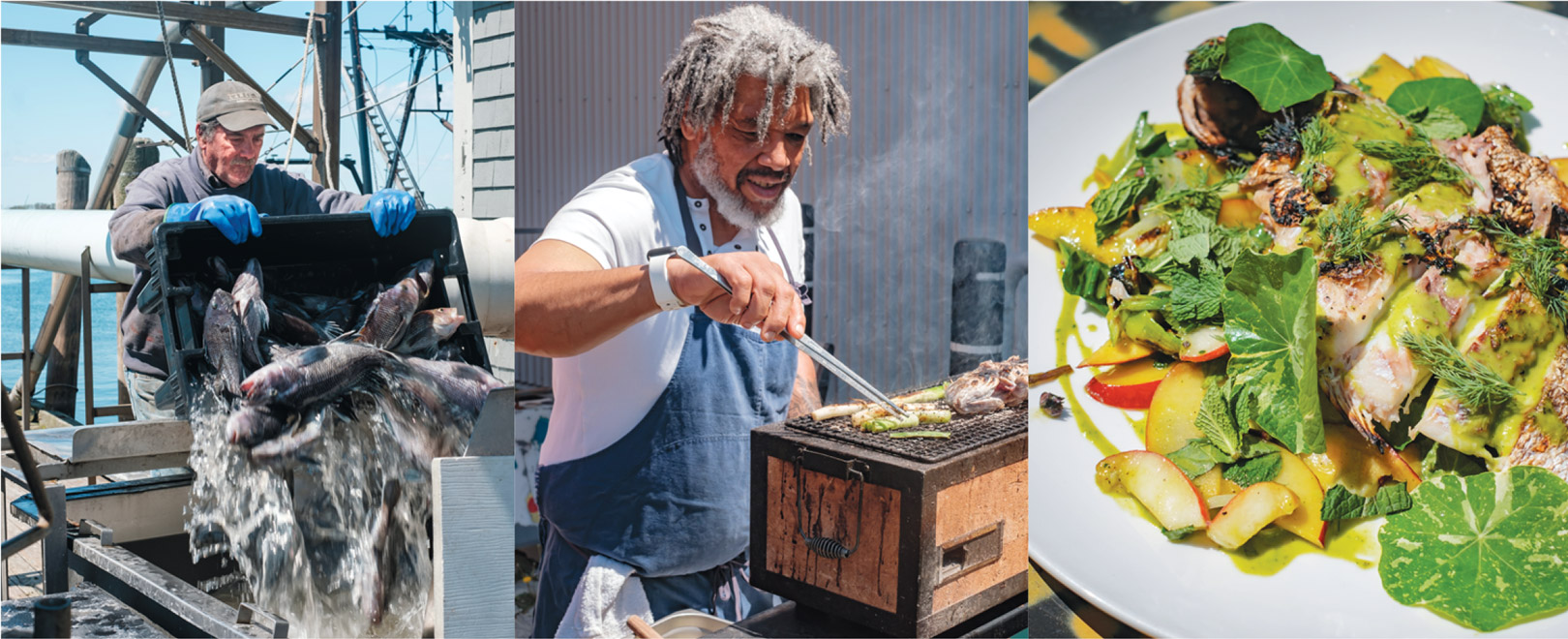Climate Winners Seafood
Fishing and Eating in Step with New England’s Warming Waters
It’s no secret: New England waters are heating up, and not just because we’re heading into the summer months. Ocean temperatures in this region are rising faster than anywhere else in the United States. To adapt, many fish populations are moving north, altering where and when local fishers can access them.
“The species around here have changed a lot over the years,” says Rodman Sykes, a fisher-man out of Point Judith. “Species we used to see in high abundance—white and red hake, whiting—are starting to move away from this area.”
Amid concerns about warming waters, there’s also room for optimism, especially with the emergence of “climate winners”—species poised to thrive in these changing conditions by expanding in the region or buffering climate effects (think oysters and kelp!). Adaptability is second nature to fishers like Sykes, who has spent 40 years captaining his boat, the Virginia Marise: “It takes a lot of flexibility and creativity to do what we do, to respond to these changes out on the water.”
Like other local small-boat fishers, he switches up his target species as much as he can to match local fluctuations. Diversifying catch offers a financial safety net for fishers and spreads out fishing pressure to lessen impacts on local ecosystems. Where others may focus on the high volumes of a few species that tend to service large distributors and supermarkets, Sykes’s “close to home” approach brings him back to the essence of small-boat fishing: “Fishing the way I do has been sustainable for the long-term. It’s allowed me to keep my independence on the water, and even help out with fisheries research projects in the community.”
Climate winners include: kelp, green crabs, scup, black sea bass, blue crabs, squid, grey triggerfish, fluke, Atlantic croaker, Spanish mackerel, Atlantic butterfish.
It’s also kept him on top of species shifts: In recent years, his catch has been dominated by local climate winners like scup, fluke (summer flounder) and black sea bass.
POPULARITY CONTEST
But it’s not just about catching the right species; it’s also about bringing them to market. This is where the rest of the supply chain comes into play, including processors, distributors, retailers and, of course, consumers. The process of introducing species into the New England marketplace is both challenging and exciting.
Enter Climate Winner Seafood Supply Chains, a collaborative project led by Eating with the Ecosystem, a nonprofit dedicated to promoting a sustainable approach to New England seafood. They’re working with dozens of seafood businesses across the region to explore the potential of climate winner species in the region’s marketplace.
So far, nearly all businesses have taken interest in selling the featured climate winners, which include popular local species like black sea bass, summer flounder and longfin squid, plus some species predicted to move into our waters such as red drum, Spanish mackerel and grey triggerfish. With enthusiasm, however, comes a notable obstacle: consumer demand. Many consumers are hesitant to embrace these new species due to unfamiliarity with their taste, texture and preparation methods.
FOLLOW THE LEADERS
Bridging the demand gap is essential for a climate-ready future. Local restaurants across Rhode Island are leading the way. Known for their creativity and experimentation, chefs are often the first channel for introducing consumers to unfamiliar species. Jason “JT” Timothy, culinary director at Troop in Providence, is one such chef. Timothy’s menu is rooted in global street food and kicked up a notch with upscale flair. His approach is seasonally driven: “The market does the talking,” he says, when describing how they come up with new dishes. “Looking at the product and seasonal produce gives us our inspiration.”
Over the years, Timothy has developed strong relationships with local seafood suppliers to get his hands on the freshest catch each week, including local “climate winners.” When asked about which climate-adaptive he’s most interested in, green crabs—an invasive species whose population in the region has skyrocketed due to warming waters—were at the top of his list.
“It’s a really neat species. I could see us doing all sorts of soups and stews with it.”
As for getting customers to like these new dishes, he says it’s about drawing parallels to the species they know and love. (Making the food taste delicious doesn’t hurt, either.)
To Timothy, emphasizing climate winner species is not only a sustainable and exciting challenge, but also a win for customers’ palates: “It opens the doors to curiosity, and essentially a new culinary world for them to embrace and enjoy.”
While restaurant dishes using new ingredients often involve lots of time and skill, Timothy says home cooks shouldn’t be intimidated. “Get out and try it. Whether it’s whole fish or fileted, give [climate winners] a try. Don’t be scared of it—it’s already dead. It’s not going to bite you!” Whether in the kitchen or at the restaurant, trial and error can allow everyone to enjoy and succeed with delicious local seafood.
Climate winner species aren’t a cure-all for the challenges facing fisheries, but they can be a valuable tool in navigating a warming planet. Ultimately, eaters will help shape the future of New England seafood. Willingness to try new species, paired with a bit of creativity, can go a long way. By embracing climate-ready seafood, we can activate flexibility from boat to plate.
Nicky Roberts is a project coordinator at Eating with the Ecosystem, a nonprofit dedicated to promoting a place-based approach to sustaining local seafood in New England. As a consultant, she also leads strategies focused on diversifying seafood hubs in the name of resilient food systems
Jason “JT” Timothy’s climate-winning recipe for Grilled Scup with Charred Green Onion, Stone Fruit and Basil Vinaigrette.
For more about Climate Winner Seafood, visit EatingWithTheEcosystem.org.






